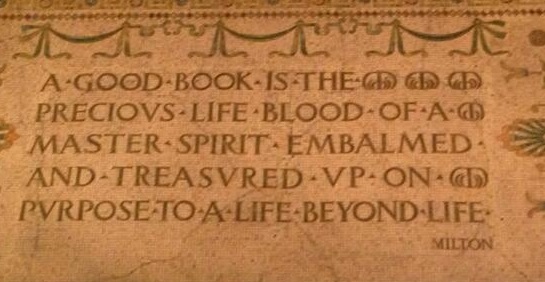NEH Institute looks at translation studies and ways to teach translation
by The College of Education / Sep 20, 2013

Professor Chris Higgins is so passionate about the scholarly craft of translation—not only studying and teaching it, but also its cultural dimensions and importance—that he and professor Elizabeth Lowe spent countless hours applying for a National Endowment for the Humanities (NEH) grant in order to organize a three-week, residential institute that would fill a unique gap in research and teacher training.
Higgins, associate professor of Education Policy, Organization and Leadership, and Lowe, professor and director of the Center for Translation Studies (CTS) in LAS, bring two different approaches to the field: Higgins is a philosopher of translation while Lowe is a literary translator who has just launched an M.A. program for professional translators and interpreters.
Held this past July at the U of I at Urbana-Champaign, The NEH Summer Institute for College Teachers provided an introduction to translation studies and examined case studies on 20th century inter-American literature, the Bible, Sigmund Freud, and the poet Rainer Maria Rilke. As someone who studies humanism and the humanities, Higgins was able to take a lead in constructing case studies for the institute that would highlight the range of translation as a humanistic concept.

Designed for scholars from across the humanities and humanistic social sciences, like teachers of history, literature, linguistics, philosophy, psychology, religion, and multi-disciplinary core humanities courses, the institute helped scholars like Stacey Alba Skar, a faculty member from Western Connecticut State University who recently developed a new course on Spanish translation. "I have several published Spanish-to-English translations, but I had never studied translation theory."
Titled "The Centrality of Translation to the Humanities: New Interdisciplinary Scholarship," the institute featured a dynamic visiting faculty, including renowned translators Gregory Rabassa, Suzanne Jill Levine, and David Rosenberg; leading translation studies scholar Rainer Schulte; and Adam Phillips, the noted psychoanalytic essayist and editor of the New Penguin Freud. According to Higgins and Lowe, though, "it was ultimately the interest and expertise of the summer scholars that drove the collective inquiry."
Faculty from a variety of institutions and at all stages of their careers applied to participate in the institute and 22 were accepted, along with three advanced graduate students.
The university was represented by Higgins and Lowe, as well as Richard Layton and Joyce Tolliver. In addition, College of Education doctoral student Maria Cynthia Anderson served as program coordinator.
For NYU Ph.D. candidate Kathryn Vomero Santos, timing was everything. "I came to the institute at the tail end of my dissertation project on the dramatic representation of translation in early modern England, so it was especially invigorating for me to see how my work fit into the rapidly growing field of translation studies," Santos said. "I was able to get a sense of how translation studies developed at the intersection of many disciplines and where it is headed."
The NEH grant application process was rigorous and preparation for it was lengthy, spanning across two years. "It is not easy to win one of these grants, especially as first-time applicants," Higgins explained, "so we were thrilled when we got the news.”
Higgins and Lowe were interested in getting the grant because, in their view, translation has typically been either misunderstood or understood too narrowly, with its complexity and importance often overlooked. "Throughout higher education, teaching and research is being shaped by translation in fundamental ways, but the work of the translator often remains invisible and unappreciated," Higgins explained, adding that on some campuses, tenure and promotion committees are reluctant to count translations as contributions to scholarship.
"Whether we like it or not, texts are transformed in translation. To treat the translated text as a simple stand-in for the original is to overlook both possible distortions in meaning and the ways in which new aspects of a text come to light only through translation," Higgins said. "Done well, translation is a productive process."
Higgins and Lowe thought that an institute of this sort would help establish the humane significance of translation and highlight a concept that has the potential to spark rich, interdisciplinary work in the humanities.
"Indeed, when we broaden our view of translation beyond interlingual translation—e.g. translating Dante into English—to include translation across temporal horizons, conceptual schemes, and personal frameworks, we realize that education itself is nothing other than (and nothing less than!) a complex process of translation and meaning-making," Higgins said.
Higgins approaches translation studies from a background in philosophical hermeneutics (translation, please), which is the study of the nature of understanding and interpretation, tradition and innovation. He argues that translation is the central concept in hermeneutics.
Along with his faculty appointment in EPOL, Higgins holds affiliate appointments in the Unit for Criticism and Interpretive Theory and the CTS. His book, "The Good Life of Teaching: An Ethics of Professional Practice" (Wiley-Blackwell, 2011) offers one of the first systematic extensions of virtue ethics to questions concerning work and professional identity. He is currently working on the book "Humane Letters: Recovering a Humanistic Language for Teaching, Learning, and Scholarship."
The NEH summer institute program resonated with Higgins' own work in the ethics of teaching. "In 'The Good Life of Teaching,' I make the case that a flourishing teacher, someone still in touch with their growing edge, is a necessary condition of true education."